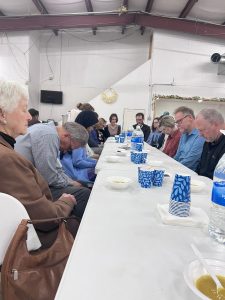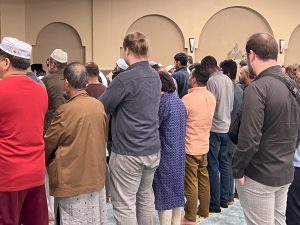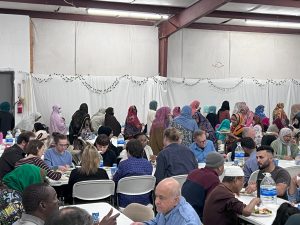by Owen Haynes
Every night at iftar–the breaking of fast during the holy month of Ramadan–congregants eat dates at many mosques across the globe, including the Medina Institute in Little Rock, Arkansas. Dates are not a necessary part of the process, they are a tradition, but waiting to eat until sunset is. During the holy month of Ramadan, Muslims worldwide fast during the day and eat when it’s dark. Fasting is a part of several major religions, a practice that reminds adherents of not only the prominent fastings of major prophets like Jesus and Muhammad, but also reminds the adherents to be thankful, thoughtful, and engage in prayer. Many believe hunger pangs are to remind individuals to pray, which can become especially relevant in a world filled with screens and constant distractions. Much of the Muslim community in Little Rock go to their mosque before sunset to practice this tradition.

Praying before breaking fast at Iftar.
But outside the Madina Institute before an iftar celebration sits a force seemingly opposed to the peaceful worship inside: the Little Rock police department. One officer guarded the door and others sat in the several police SUVs in the parking lot, all equipped with firearms, pepper spray, stun guns, and handcuffs. Although the city government did dispatch officers to local mosques and synagogues after the October 7th attacks, these officers are hired by the mosque to keep everyone inside safe. Muslim hate crimes were on the decline in recent years but have begun to rise since October 7th, according to the Council on American-Islamic Relations.

Worshippers and students from Dr. Glazier’s religious freedom class in the prayer hall.
Ifar, however, is not canceled in the face of potential threat. The potential threat does not scare away guests, either. At the Madina Institute, all are welcome–not just Muslims. Guests are ushered past police and to their table. As is a custom in Islam, men and women eat on either side of a room. Guests receive special treatment. They are allowed to eat at a mixed-gender table in the center of the room. They are given plenty of food that would be used to break fast when the time comes, like lentil soup, dates, and rose water. Congregants and mosque leaders approach guests to explain the process of Iftar shortly before the ceremonies start. Everyone, including non-Muslims, broke fast, listened to the imam’s prayer, and was invited to enter the prayer hall to either observe or pray.

Madina members and guests share an Iftar meal.
Even with the smell of food and festivities coming from inside, Little Rock police continue to sit outside and deter any wrong-doers. Worshipers inside can pray with the peace of mind these officer’s presence provides. A large feast follows prayer, with guests being ushered to the front of the line. Guests are given desserts after dinner, while some Muslims choose to pray two or more hours before having a bite of rice pudding. Through nightly worship they complete the recitation of the Quran during the month of Ramadan. Guests are welcome to leave when they wish and are once again supervised by officers as they leave. Iftar being protected by local law enforcement shows a side of American religious freedom many Americans do not see often. Many Americans either go to church or go to no worship services at all, likely never seeing police protection over worship. These officers protect not only the right for the worshipers to practice their traditions, but they also protect the guests with whom the local mosques share their culture. These cultural connections make Little Rock the place it is, thanks to the Little Rock police department. Ramadan Mubarak.